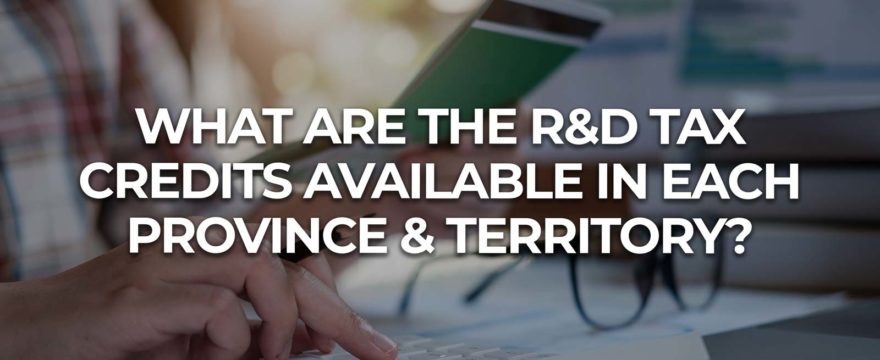
The federal Scientific Research and Experimental Development (SR&ED) tax credit program is one of the largest funding resources for research and development (R&D) offered by the Government of Canada. Many businesses that rely on these federal tax refunds to invest in further innovation can also seek additional R&D funding from provincial or territorial governments.
Learn more about R&D tax credits by province and territory to see what your enterprise may be eligible to receive.
Alberta
In Alberta, qualifying organizations may obtain assistance through the Innovation Employment Grant (IEG). This grant replaces the original R&D tax credit available to businesses in Alberta. It delivers up to 20% of eligible costs for R&D efforts conducted in the province.
This grant provides an 8% payment for certain R&D expenses performed in Alberta and an enhanced 20% payment for R&D expenditures that surpass your company’s base spending level. The base spending level is the median R&D spending for the past two years. Expenses accrued after December 31, 2020, qualify.
British Columbia
Canadian-controlled private corporations (CCPCs) with a permanent site in British Columbia who plan to perform SR&ED in the province may seek a refundable tax credit of up to 10% of qualifying expenditures up to the expenditure limit of $3 million. Non-CCPCs, such as businesses that are members of partnerships, may receive a non-refundable credit at 10% of qualified costs.
Manitoba
Provincial SR&ED tax credits differ slightly in Manitoba based on when your organization incurred qualifying expenses. If R&D activities were performed after 2009 and before April 12, 2017, the rate is 20%. For eligible expenses acquired after April 11, 2017, the rate is 15%.
New Brunswick
In New Brunswick, corporations may seek a tax refund of 15% on qualifying expenses starting in January 2003. Eligible businesses must have a permanent establishment in New Brunswick and plan to carry out qualifying R&D activities in the province.
Newfoundland and Labrador
In Newfoundland and Labrador, corporations may obtain a tax refund for 15% of eligible expenditures. Enterprises must have a permanent site in the province and intend to conduct SR&ED there to qualify.
Nova Scotia
Many businesses, including trust beneficiaries and partnership members, may claim SR&ED tax credits for 15% of eligible expenditures in Nova Scotia. Like other provincial programs, the main stipulation is that they have a permanent stake in the province and perform R&D in the region.
Ontario
In addition to the primary R&D tax credit of 3.5% of eligible expenditure, Ontario offers two other tax incentives aimed at R&D — the Ontario innovation tax credit (OITC) and the Ontario business-research institute tax credit (OBRITC). The OITC is refundable at multiple rates, including:
- 10% for tax years ending before June 1, 2016
- 8% for tax years beginning after May 31, 2016
- Prorated for a tax year that encompasses May 31, 2016
The OBRITC offers a fully refundable tax credit of up to 20% of qualifying expenses to eligible businesses. This incentive features a $20 million yearly cap, which must be distributed among corporate members of an association.
If businesses obtain financial assistance from governments or other bodies or contract payments, this support will generally decrease eligible expenses that can be claimed.
Prince Edward Island
Although Prince Edward Island does not offer an R&D tax credit, businesses may seek the Enriched Investment Tax Credit to supplement existing support from the Corporate Investment Tax Credit of 10%. This capital expenditure tax credit is designated for manufacturing and processing companies making select capital investments.
It provides a 25% tax credit on qualified costs and is rebated against future provincial income taxes. Prince Edward Island sets the funding cap at 75% of eligible expenditures for non-repayable government sources for these businesses.
Quebec
Quebec extends refundable tax credits to corporations and partnership members conducting SR&ED activities in Canada, including those that had qualifying activities performed on their behalf. While rates for these tax incentives differ based on the type of eligible R&D work in question, Quebec offers the most generous tax credit of all provinces and territories. Some qualified expenditures and their accompanying rates include:
- Salaries and wages (14% to 30%)
- Fees and dues paid to research consortiums (14% to 30%)
- Private partnership research conducted at the pre-competition stage (14% to 30%)
Saskatchewan
CCPCs Saskatchewan may receive a 10% refundable tax credit for eligible expenses incurred on or after April 1, 2017. Other corporations may receive a 10% non-refundable tax credit on qualifying expenditures incurred after March 31, 2015. Both types of organizations can claim no more than $1 million per year.
Yukon
Businesses that wish to claim the R&D tax credit in the Yukon may receive a refund of 15% of eligible expenditures. They can also obtain an extra 5% for costs paid or payable to Yukon University. These corporations need a permanent holding in the territory and plan to perform qualifying SR&ED tasks there.
Please note: The Northwest Territories and Nunavut do not extend additional R&D tax credits to corporations. However, if your business operates in either territory, you may connect with the territorial governments to see if your projects are eligible for other types of funding.
Finance Your R&D Tax Credits with Easly
As essential as federal SR&ED funding and provincial R&D funding is for many Canadian businesses, these tax credits are only issued in the tax year after the company incurs qualifying expenses. This can make it challenging for your organization to obtain the funds required to invest in groundbreaking projects.
Easly offers a prime SR&ED financing solution — you can receive on-demand access to your federal SR&ED tax credit and provincial R&D tax credit refunds with non-dilutive Easly Advances.
Contact us today to learn more about how we can help your business finance innovation.
.png)
.png)
.png)
